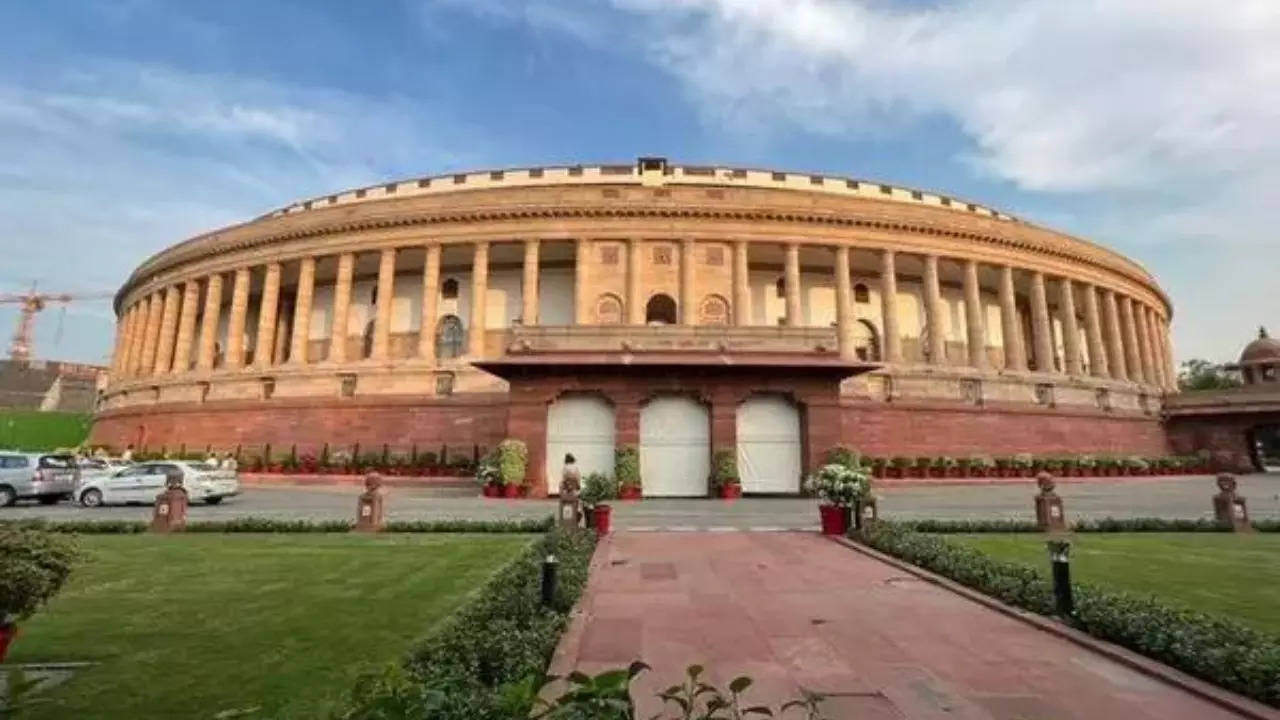[ad_1]
NEW DELHI: Both Lok Sabha and Rajya Sabha were adjourned sine die on Thursday, bringing to an end a disruption-ridden Budget session which was among the least productive in recent times as BJP insisted on an apology from Rahul Gandhi for his “democracy under threat” remarks in UK while the opposition persisted in its demand for a JPC probe into the Adani issue.
Marred by these protests, the 11th session of the 17th Lok Sabha turned out to be one of the most raucous in the recent past with productivity plummeting to 5.3 in the second part of the session even as the first part had 83.8% productivity, according to data released by think tank PRS Legislative Research.
Lok Sabha functioned for around 34% of its scheduled duration and Rajya Sabha 24%: while the Lower House functioned for over 45 hours against a scheduled duration of 133.6 hours, Rajya Sabha worked for over 31 hours out of 130.
Excluding the Finance and Appropriation Bills, the Competition (Amendment) Bill, 2022 was the only bill passed during this session. The bills were passed without any discussion in either House.
In his closing remarks, RS chairman Jagdeep Dhankhar said it was ironical that “disorder in Parliament is turning out to be the new order — a new norm that decimates the essence of democracy”.
BJP alleged that even on the last day of the session, Congress and other opposition members showed their unruly behaviour and insulted Parliament by wearing black clothes. “The country is run by a system, it will not run by the arbitrariness of Congress,” said Union minister Kiren Rijiju, accompanied by his colleagues Piyush Goyal and Arjun Ram Meghwal.
In his concluding remarks, Lok Sabha Speaker Om Birla said the House held discussions on the General Budget for 14.45 hours, and 145 MPs participated in it. Discussions on the Motion of Thanks to the President’s Address were held for 13 hours and 44 minutes with the participation of 143 MPs.
Of all the Lok Sabhas that completed the full five-year term, the 16th Lok Sabha – elected in 2014 – recorded the lowest number of sitting days, having sat for 331 days in five years.
With one more year remaining in the term, and 58 average sitting days a year, the 17th Lok Sabha is unlikely to sit for more than 331 days. This could make it the shortest full-term Lok Sabha since 1952.
This has been the sixth shortest budget session since 1952. The session started on January 31 with a recess from February 14 to March 12.
Marred by these protests, the 11th session of the 17th Lok Sabha turned out to be one of the most raucous in the recent past with productivity plummeting to 5.3 in the second part of the session even as the first part had 83.8% productivity, according to data released by think tank PRS Legislative Research.
Lok Sabha functioned for around 34% of its scheduled duration and Rajya Sabha 24%: while the Lower House functioned for over 45 hours against a scheduled duration of 133.6 hours, Rajya Sabha worked for over 31 hours out of 130.
Excluding the Finance and Appropriation Bills, the Competition (Amendment) Bill, 2022 was the only bill passed during this session. The bills were passed without any discussion in either House.
In his closing remarks, RS chairman Jagdeep Dhankhar said it was ironical that “disorder in Parliament is turning out to be the new order — a new norm that decimates the essence of democracy”.
BJP alleged that even on the last day of the session, Congress and other opposition members showed their unruly behaviour and insulted Parliament by wearing black clothes. “The country is run by a system, it will not run by the arbitrariness of Congress,” said Union minister Kiren Rijiju, accompanied by his colleagues Piyush Goyal and Arjun Ram Meghwal.
In his concluding remarks, Lok Sabha Speaker Om Birla said the House held discussions on the General Budget for 14.45 hours, and 145 MPs participated in it. Discussions on the Motion of Thanks to the President’s Address were held for 13 hours and 44 minutes with the participation of 143 MPs.
Of all the Lok Sabhas that completed the full five-year term, the 16th Lok Sabha – elected in 2014 – recorded the lowest number of sitting days, having sat for 331 days in five years.
With one more year remaining in the term, and 58 average sitting days a year, the 17th Lok Sabha is unlikely to sit for more than 331 days. This could make it the shortest full-term Lok Sabha since 1952.
This has been the sixth shortest budget session since 1952. The session started on January 31 with a recess from February 14 to March 12.
[ad_2]
Source link






Join The Discussion